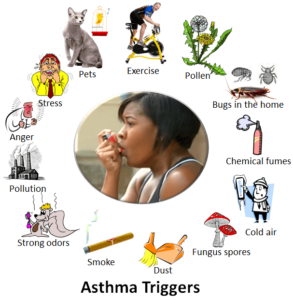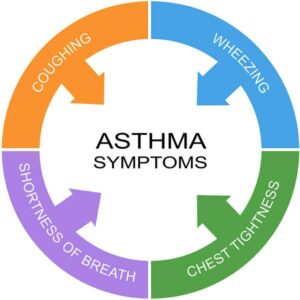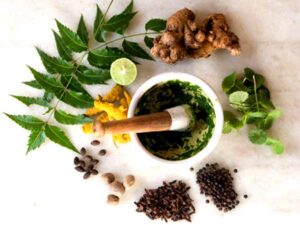Ayurvedic
Ayurvedic Remedies for Asthma
Asthma:
Bronchial Asthma is a major global health problem nowadays, which can affect the population irrespective of sex, age, chemicals used in various factories, economic status, occupational conditions, stress, poor hygiene, etc. Asthma Treatment Ayurveda, the term ‘Shwasa’ word is used to describe the process of respiration. When there is a disturbance in the processing of the exchanging of gases, then the condition is called ‘Shwasa Roga’. And in Ayurveda, this Roga is said to be the disorder of the Pranvaha Srotasa.
There are mainly 5 types of Shwasa Roga, named as:
-
Mahashwas
-
Urdhwashwas
-
Chinnashwas
-
Tamakshwas
-
Kshudraswas
According to Asthma Treatment Ayurveda, Bronchial Asthma is termed as – ‘Tamaka Shwasa’ The word Tamaka is derived from the Dhatu ‘Tamglanou’ which indicates Sadness and Darkness. The disease is called Tamaka as an attack of the disease precipitate during the night and the condition of the patient is so severe that he/she feels entering into the darkness.

Causes of Asthma:
Main causative factors or Hetu that are responsible for Tamaka Shwasa are-
- Dhuma (Smoke)
- Raja (Dust)
- Sheeta sthananivasa (Residing in cold areas)
- Guru bhojana (Heavy diet)
- Virudhahaar (improper food combining)
- Sheeta bhojana (Cold food/works) and when a person continuously intakes the above-mentioned causes, that will lead to the vitiation of Vata dosha which in turn aggravate Kapha dosha and lead to vitiation of Rasa and disturbs the functioning of Pranavata.

Signs and Symptoms:
According to Ayurveda Acharyas, Vata is captured by the Aavrana of Kapha in the disease. Purvarupa or prodromal signs and symptoms are indicated as warming alarm for the forthcoming disease. When a person going through the Tamaka Shwasa, they can experience some of the following symptoms –
-
Gurghurkam (audible wheezing)
-
Anaha
-
Arati
-
Shula
-
Shiro abhyanga (heaviness in the head region)
-
Kricchat bhashitum (difficulty in speaking), etc.
Maharashi Charaka has mentioned two-alied stages of Tamaka shwasa named as – ‘Pratamaka’and ‘Santamaka’.
It was noticed that there is an involvement of Pitta dosha in Pratamaka shwasa and when get a person is afflicted with fever and fainting, the condition is known as – Pratamaka Shwas. It is aggravated by indigestion, suppression of natural urges, Tamoguna, humidity and by the cooling regimens. When the patients of Pratamaka Shwasa feels submerged in darkness, then the condition is known as Santamaka Shwasa.
Types:
There are three types of Asthma are mentioned in Ayurveda texts, named as – Vataj Asthma, Pittaj Asthma, and Kaphaj Asthma.
Here we described the appropriate signs and symptoms according to the presence of dominating doshas-
- Vataj Asthma – In this a person suffered from dryness, wheezing, constipation, anxiety, dry cough, and the attacks occur during Vata times at dawn and dusk.
- Pittaj Asthma – The person suffered from mild fever, sweating, irritability, coughing, wheezing but with yellow phlegm. Attacks mainly occur during the Pitta times of day, noon, and midnight.
- Kaphaj Asthma – In this type of Asthma, there is abundant white or clear phlegm with a cough. Rather of wheezing, there will be a railing sound by the fluids in the lungs which can also be heard during respiration.
Pathophysiology:
It was described that due to regular intake of the causes, doshas are getting imbalanced, which results in agnimadhya and will lead to the formation of the ama (Improper digestion of Rasa dhatu). Then, the ama combines with vata and creates an aavran in strotasa that obstructs the dhatu vehan and will lead to increased Kapha dosha, and hence the natural direction of Vata is blocked and it flows in reversible direction (Pratilom vayu). Vata dosha naturally has a dry property and due to an increase in its quantity, natural lubrication is disturbed and a patient feels difficulty in breathing.
Proper identification of purvarupa is very important because the earliest treatment will yield the best and proper result that prevents secondary infections also.
 Asthma Treatment Ayurveda – According to Ayurvedic Concepts, Asthma natural treatment is divided into two major types – ‘Shaman Chikitsa’, in which diseases causing factors or doshas are suppressed by the Ayurvedic medicines and ‘Shodhana Chikitsa, in which doshas are elements from the body by some of the Panchakarmas procedures.
Asthma Treatment Ayurveda – According to Ayurvedic Concepts, Asthma natural treatment is divided into two major types – ‘Shaman Chikitsa’, in which diseases causing factors or doshas are suppressed by the Ayurvedic medicines and ‘Shodhana Chikitsa, in which doshas are elements from the body by some of the Panchakarmas procedures.
Ayurveda has been widely accepted as an alternate and almost permanent natural treatment for Asthma because we work on the root cause and prescribed the medicines according to the aggravated doshas.
According to the Ayurveda Acharyas, no two people are treated in the same way in Asthma Treatment Ayurveda, so it is very important to understand the different characteristics, which manifest according to the Vataj type, Pittaj type, and Kaphaj type symptoms. Ayurvedic medicines are produced from various herbs, minerals, vitamins, and proteins that improve immunity and help the body to fight against any type of infection. Besides the medicines, the patient needs to willing to be an active participant in the healing process, making some of the dietary and lifestyle changes, eliminating the causative factors of both dietary and mental, etc.
The most important concept in Ayurveda is ‘Nidanparivarjan’ means the elimination of the causative factors, so it is very important to restrict some of the diet and lifestyle functioning, for example – lassi, egg, meat, fish, cold drinks, sour fruits, rice, meat, etc. Care should also be taken to avoid exposure to dust, cold, smoke, polluted environment, excessive walking, exercise, etc.
Alternatively, yoga also improves the strength, flexibility, and capacity of the lungs that are necessary components of overall fitness. It has been shown in clinical trials with asthmatic patients, that yoga therapy improves lung functions and reduces the frequency of exacerbations. Yoga is taught along with the Pranayama, which emphasizes the awareness and control of breath. Pranayama develops respiratory capacity by moving and strengthening the diaphragm, increasing the flexibility of lung tissue, pleura, trachea and lung air capacity.
Although, Medication also supports to overcome the symptoms and provide physical, mental, emotional, and psyche relaxation during asthma natural treatment.
There are many ayurvedic medicines for asthma that provide relief and give the best result in Asthma Treatment Ayurveda. As general a person can use Ginger, Garlic, Turmeric, Cinnamon, Honey, Bay leaf, etc. on a regular basis to enhance immunity and prevents a certain type of infection.
Here, we approach in Ayurveda for Asthma Treatment which helps to rejuvenate the innate healing response for a complete physical and mental healing. Selected herbal medications are given to a patient to aid the healing process, strengthening digestion and help the body purify itself

‘DEEP AYURVEDA’ has provided you the best Asthma Treatment Ayurveda to cure the Acute as well as Chronic Asthma from its root cause. Some of the best ayurvedic medicines for asthma that recommended in Ayurveda for Asthma Treatment are given below –
- Swasini Syrup
- Swasini Capsules
- DA-IMMUNO Capsule
- Curcumin Capsules
- Giloy Capsules
- Combination of Classical Medicines
- Herbal Nasal Drop
To know more information about Ayurveda for Asthma Treatment click here
The above-mentioned medicine are made up of 100% pure herbs extracts which work as an expectorant (helps in expelling the phlegm), anti-oxidants, anti-inflammatory, antitussive, and helps in clearing the obstructive airways and allows a person to breathe freely. The medicines can be used by any age of the person.
Additionally, a person can follow some of the following precautions to get proper relief in Asthma Treatment Ayurveda-
- Drink plenty of water and useful liquids to keep secretions loose.
- Don’t suppress natural urges like urination, thirst, and cough. In addition, a person should avoid smoking and move in the sun.
If a person suffered from continuous cough, make a paste of rock salt and old ghee or mustard oil and rub it on the chest for some time.
- Alternatively, a person can massage Saindhavaadi Oil on a regular basis on the chest.
- While resting, place a hot towel over the chest, this helps to relax the muscles and restores normal breathing.
- Maintain optimal humidity.
- Lose excess weight to manage asthma, as obesity is an also a sneaky cause that makes it more difficult to control the symptoms.
For more detail on Ayurveda for Asthma Treatment, please visit our nearest clinic or if you want to consult with our Chief Ayurveda Consultant & Founder – Dr.Baldeep Kour then write with detail history at info@deepayurveda.com
Statutory Warning: Self-medication can be very dangerous. Always use ayurvedic medicine under the strict supervision of an ayurvedic doctor.


